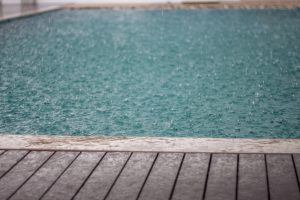What Rain Can Do to Your Pool

Rainwater Can Have a Negative Effect on Your Pool
Rain is one of many natural forms of precipitation throughout the world. While many people love the sound it makes while hitting your roof or the cooling nature it has, many have not thought about what rain can do to your pool. Just because rain is water does not mean it should be in your pool.
Storms and rain can have quite a large effect on your pool if you don’t take the necessary precautions to either protect your pool or properly clean it afterward.
Rain’s Effect
Your pool has a delicate chemistry that should be maintained to ensure the water is safe and clean.
Because of pollution from many other industrial gases, the rain across most of the U.S. has an acidic pH level, making acid rain. However, the acidity of the precipitation does vary depending on where in the country you are. Regardless, your pool’s chemistry will always be affected by rain.
Even your chlorine levels will be affected because a lot of your pool’s chlorine will be consumed after attacking these new pollutants to protect your pool. The Total alkalinity will also be reduced as it works to try to keep the pH level even. The human body’s natural pH level sits around 7.3 to 7.5, so keeping your pool at this level will allow swimmers to feel comfortable while in the water. Once the pH level gets out of this range, swimmer’s skin and eyes may begin to feel some irritation.
Outside of rainwater, run-off water travels into your pool and contains debris like leaves, dirt, and other contaminants that also affect your water’s chemistry. The pH, calcium hardness, alkalinity, and all other chemical levels will all be changed by both rain and run-off water.
What You Can Do
The best thing you can do to preserve your pool chemistry is to protect it. Having a pool cover is the best option to ensure that rainwater does not contaminate your pool. Even if you do use a pool cover, it is still important to test your pool’s chemistry after a storm. If you don’t have a cover, and a lot of rain has gotten into your pool, follow these helpful steps to clean it:
- Remove Debris: The first thing you should do after a storm is to use your pool skimmer and remove any floating debris from your pool. If possible, use a leaf rake to remove any debris that may have sank to the bottom of the pool as well.
- Vacuum You Pool: Try to brush as much debris from the steps or ladders as possible. Also, brush as much from the bottom of the pool to break it free. Once you have finished brushing, you can use a pool vacuum to pick up any dirt or particles left from over.
- Drain Excess Water: Chances are your pool collected too much water than it needs, so you should drain it to get it level once again.
- Test Your Pool Chemistry: Once all of the dirt and debris has been removed from your pool, test its chemistry to figure out what you need to replace. If the storm was big, you may need to take a sample from your pool to a pool care professional. Once tested, add the appropriate chemicals to even the chemistry levels.
It is important to always have the proper pool cleaning tools on hand to ensure that you are ready for situations like this. While you don’t need to, you can also shock your pool to help fight off any contaminants left in the water.
While rain can be nice and helpful for a number of reasons, it does not do your pool any good. It can drastically change your pool’s chemistry and even corrode your pool equipment. If you are in need of information to protect your pool from rain or how to clean it, contact the pool experts at Mid City Custom Pools.
